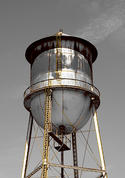I nearly fell off my bicycle when I read that driving had declined 43% in the United States and transit use had increased 65%. Australia's The Fifth Estate attributes these figures to Professor Peter Newman of Sydney's Curtin University at an event at the Hassell architectural and urban planning firm offices in Sydney. In speaking about a declining driving trend in Australia, The Fifth Estate reports Professor Newman as saying that:* read more »
Transportation
The Need to Expand Personal Mobility
Few books in recent memory have started from as optimistic or solid a foundation as Reinventing the Automobile: Personal Urban Mobility for the 21st Century. Reinventing the Automobile conveys a strong message that improved personal mobility is necessary and desirable: read more »
Despite Transit's 2008 Peak, Longer Term Market Trend is Down: A 25 Year Report on Transit Ridership
In 2008, US transit posted its highest ridership since 1950, a development widely noted and celebrated in the media. Ridership had been increasing for about a decade, however, 2008 coincided with the highest gasoline prices in history, which gave transit a boost. read more »
- Login to post comments
Is Pennsylvania History?
On a recent whirlwind through Pennsylvania, I thought of James Carville, who popularized the notion that “It's Philadelphia on one side, Pittsburgh on the other, and Alabama in the middle.” It’s a clever line, but between the Ohio and Delaware rivers he is missing a great American tapestry: the wreck of the Penn-Central, United flight 93’s final frantic moments, the social history of the Johnstown flood, and whether a state of steel and coal is past or present. read more »
Time to Dismantle the American Dream?
For some time, theorists have been suggesting that it is time to redefine the American Dream of home ownership. Households, we are told, should live in smaller houses, in more crowded neighborhoods and more should rent. This thinking has been heightened by the mortgage crisis in some parts of the country, particularly in areas where prices rose most extravagantly in the past decade. And to be sure, many of the irrational attempts – many of them government sponsored – to expand ownership to those not financially prepared to bear the costs need to curbed. read more »
Twenty-first Century Electorate’s Heart is in the Suburbs
Even as the nation conducts its critically important decennial census, a demographic picture of the rapidly changing population of the United States is emerging. It underlines how suburban living has become the dominant experience for all key groups in America’s 21st Century Electorate.
While suburban living was once seen as the almost exclusive preserve of the white upper-middle class, a majority of all major American racial and ethnic groups now live in suburbia, according to the newest report on the state of metropolitan America from the Brookings Institute. read more »
The Limits Of The Green Machine
Environmentalism is strangely detached from the public's economic goals.
The awful oil spill in the Gulf--as well as the recent coal mine disaster in West Virginia--has added spring to the step of America's hugely influential environmental lobby. After years of hand-wringing over global warming (aka climate change), the greens now have an issue that will play to legitimate public concerns for weeks and months ahead.
This is as it should be. Strong support for environmental regulation--starting particularly under our original "green president," Richard Nixon--has been based on the protection of public health and safety, as well as the preservation of America's wild spaces. read more »
Santa Fe-ing of the World
This is part one of a two-part piece. Read Part two.
Human settlements are always shaped by whatever is the state of the art transportation device of the time. Shoe-leather and donkeys enabled the Jerusalem known by Jesus. Sixteen centuries later, when critical transportation has become horse-drawn wagons and ocean-going sail, you get places like Boston. Railroads yield Chicago – both the area around the “L” (intraurban rail) and the area that processed wealth from the hinterlands (the stockyards). The automobile results in places with multiple urban cores like Los Angeles. The jet passenger plane allows more places with such “edge cities” to rise in such hitherto inconvenient locations as Dallas, Houston, Seattle and Atlanta and now Sydney, Lagos, Cairo, Bangkok, Djakarta, and Kuala Lumpur. read more »
It's the Jobs, Stupid: Infrastructure Matters
It may surprise you to know that some policy makers and academics believe that “nothing matters” when it comes to infrastructure -- the physical structures that make water, energy, broadband and transportation work -- and economic prosperity. The thrust of the idea that infrastructure doesn’t matter may have started with Larry Summers, appointed by President Obama as Director of the National Economic Council in 2009. The New York Times says he is “the only top economic adviser with a West Wing office” – meaning he is very powerful in Washington terms. read more »
Livable Communities and the DOT
“Fostering livable communities...is a transformative policy shift for U.S. DOT,” announced grandiloquently the Draft U.S. DOT Strategic Plan released for public comment on April 15, 2010. But what exactly does the Administration mean by “livability” and how does it intend to translate this vague rhetorical abstraction into a practical reality? read more »




















